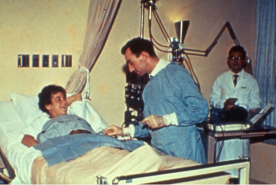About
Lara Tushla, MSW, LCSW, NSW-C
After transplant you will follow up with your transplant team frequently at first and then less and less as time goes on. If at any point in time you are having trouble managing their care, affording medications, you should contact your transplant center or nephrology office right away! There are many physical, emotional, and financial changes that occur if you've been on dialysis and then receive a kidney transplant. Here's some information to help you understand your financial responsibilities both before and after transplant.
The American Kidney Fund (AKF)
- The Health Insurance Premium Program (HIPP), which assists in paying insurance premiums, is only available to patients who are on dialysis. Therefore, if the American Kidney Fund's HIPP program is currently paying your insurance premiums you should know that these premiums will become your responsibility immediately after transplant.
Often the HIPP program pays for the premium for dialysis patient's secondary insurance (Medigap policy). This supplemental insurance paysfor the 20% copays after Medicare Part B pays 80% of the immunosuppressant drugs needed after transplant. Without that supplemental insurance the immunosuppressant medication would costapproximately $250-500/month, depending on dosing.
You need to know how much the premium for this insurance is and make a plan for how you will cover the premium payments after transplant or be responsible for the 20% copays, including those for the immunosuppressant drugs. - The Safety Net program is only available to patients who are within their first 5 years post-transplant. Applications need to be resubmitted yearly by a social worker; however, this is not done automatically. You will need to alert your transplant social worker that it's time to reapply for the grantand request that the application be resubmitted.
Medicare
- Medicare Part B covers the anti-rejection medications, not Part D.
- Pro: These medications don't put patients into the donut hole.
- Con: If you qualify for Extra Help but not Medicaid, the copay for the anti-rejection medications is several hundred dollars a month.
- There are federal regulations that guide which insurance pays and in what order. Patients cannot decide that they want Part D to cover their immunosuppressant drugs because the benefits are better. You cannot decide that you want your employer plan to pay for your medications and other care primary forever.
- If the only reason you have Medicare is because of kidney failure, your Medicare coverage will end 3 years after your kidney transplant. If you are 65 or older or have another qualifying disability your Medicare will continue.
- Be sure to keep your Medicare Part B active! If you don't you may be put "on hold" or "inactive" on the transplant list if your Medicare is primary and the Part B is not active. Secondary payers have every right, and almost always will, only cover the 20% copays that they would be responsible for.
- Many of the non-immunosuppressant drugs are incredibly expensive, so patients end up in the donut hole soon anyway. One anti-viral medication is $1200 per month, so it is common for the Part D copay to be $400/month.
- Even if you qualify for Extra Help, there are still copays on the medications, although very limited.
- Talk to your transplant team before signing up for a Medicare Advantage plan.
- Since Medicare Advantage plans are offered by private insurance companies they may have costs associated with them that are not typical in traditional Medicare, such as 20% copays on their immunosuppressant drugs. These plans may also have limits on which hospitals or providers are "in-network".
Medicaid
- Some providers do not accept Medicaid.
- Spenddown is when you are slightly over guidelines for regular Medicaid. You are given a Spenddown coverage, which means you will have active Medicaid coverage once you spend enough money on medical expenses.
- Spenddown is very hard to meet after transplant. The only place after transplant where there is a consistent source of big medical bills to use toward spenddown, is the pharmacy and pharmacies aren't able to dispense medications without payment. Pharmacies also are not able to write off spend down amounts, like dialysis units and other big providers often do. Therefore, you will be responsible for taking medical bills to your Medicaid caseworker to meet the spenddown.
- What you need to know:
- How much your spenddown amount is
- Which bills can be used to cover it
- How to get the bills to the right person
- Copays on services are your responsibility if used toward spenddown.
- Supplemental services offered through Medicaid are not available when the spenddown is not met (ex. Transportation)
- A high spend down is not much different from only having Medicare coverage. If you can't meet your spend down, you don't have Medicaid.
Social Security Disability (SSD) and Supplemental Security Income (SSI)
A person's disability status can be reassessed 12 months after a transplant and each year afterwards. If the kidney is working well, there are few circumstances where a transplant team will certify ongoing disability status. Having a transplant, diabetes, and/or hypertension does not guarantee disability. Functional limitations are critical.
- If a person has other medical conditions which prevent him/her from working, it is important to continue to see doctors for that condition as well so that provider can comment on disability status.
Miscellaneous Expenses
- Transportation to the transplant center (including parking) can be expensive, especially immediately after transplant due to the high frequency of the visits.
- Transplant clinic visits can sometimes be long days. It is not uncommon to have to buy food at the hospital which can add up.
- If you do not live close to the transplant center, there may be housing expenses for you and/or your family members.
- The testing to remain active on the transplant waiting list will need to be updated regularly (typically annually), so the out-of-pocket expenses experienced will continue to add up while waiting for a kidney.
- There will be several new medications started at the time of transplant and typically there are more prescription copays, especially right after transplant.

















